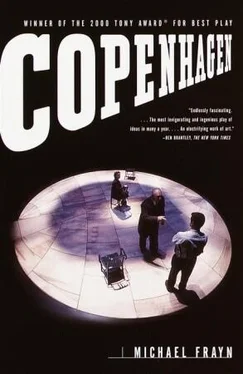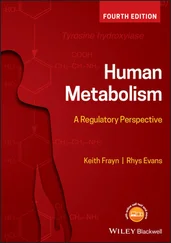Cassidy does not explore the parallel further. Powers even appends a footnote to his comment: ‘Forgive me.’ The apology seems to me unnecessary. It’s true that the concept of uncertainty is one of those scientific notions that has become common coinage, and generalised to the point of losing much of its original meaning. The idea as introduced by Heisenberg into quantum mechanics was precise and technical. It didn’t suggest that everything about the behaviour of particles was unknowable, or hazy. What it limited was the simultaneous measurement of ‘canonically conjugate variables’, such as position and momentum, or energy and time. The more precisely you measure one variable, it said, the less precise your measurement of the related variable can be; and this ratio, the uncertainty relationship, is itself precisely formulable.
None of this, plainly, applies directly to our observations of thought and intention. Thoughts are not locatable by pairs of conjugate variables, so there can be no question of a ratio of precision. Powers seems to imply that in Heisenberg’s case the uncertainty arises purely because ‘questions of motive and intention cannot be established more clearly than he was willing to state them.’ It’s true that Heisenberg was under contradictory pressures after the war which made it particularly difficult for him to explain what he had been trying to do. He wanted to distance himself from the Nazis, but he didn’t want to suggest that he had been a traitor. He was reluctant to claim to his fellow-Germans that he had deliberately lost them the war, but he was no less reluctant to suggest that he had failed them simply out of incompetence.
But the uncertainty surely begins long before the point where Heisenberg might have offered an explanation. He was under at least as many contradictory pressures at the time to shape the actions he later failed to explain, and the uncertainty would still have existed, for us and for him, even if he had been as open, honest, and helpful as it is humanly possible to be. What people say about their own motives and intentions, even when they are not caught in the traps that entangled Heisenberg, is always subject to question — as subject to question as what anybody else says about them. Thoughts and intentions, even one’s own — perhaps one’s own most of all — remain shifting and elusive. There is not one single thought or intention of any sort that can ever be precisely established.
What the uncertainty of thoughts does have in common with the uncertainty of particles is that the difficulty is not just a practical one, but a systematic limitation which cannot even in theory be circumvented. It is patently not resolved by the efforts of psychologists and psycho-analysts, and it will not be resolved by neurologists, either, even when everything is known about the structure and workings of the brain, any more than semantic questions can be resolved by looking at the machine code of a computer. And since, according to the so-called ‘Copenhagen Interpretation’ of quantum mechanics — the interconnected set of theories that was developed by Heisenberg, Bohr, and others in the twenties — the whole possibility of saying or thinking anything about the world, even the most apparently objective, abstract aspects of it studied by the natural sciences, depends upon human observation, and is subject to the limitations which the human mind imposes, this uncertainty in our thinking is also fundamental to the nature of the world.
‘Uncertainty’ is not a very satisfactory word to come at this. It sits awkwardly even in its original context. You can be uncertain about things which are themselves entirely definite, and about which you could be entirely certain if you were simply better informed. Indeed, the very idea of uncertainty seems to imply the possibility of certainty. Heisenberg and Bohr used several different German words in different contexts. Bohr (who spoke more or less perfect German) sometimes referred to Unsicherheit , which means quite simply unsureness. In Heisenberg’s original paper he talks about Ungenauigkeit— inexactness — and the most usual term now in German seems to be Unschärfe —blurredness or fuzziness. But the word he adopts in his general conclusion, and which he uses when he refers back to the period later in his memoirs, is Unbestimmtheit , for which it’s harder to find a satisfactory English equivalent. Although it means uncertainty in the sense of vagueness, it’s plainly derived from bestimmen , to determine or to ascertain. This is reflected better in the other English translation which is sometimes used, but which seems to be less familiar: indeterminacy. ‘Undeterminedness’ would be closer still, though clumsy. Less close to the German, but even closer to the reality of the situation, would be ‘indeterminability’.
Questions of translation apart, Heisenberg’s choice of word suggests that, at the time he wrote his paper, he had not fully grasped the metaphysical implications of what he was saying. Indeed, he concludes that the experiments concerned are affected by Unbestimmtheit ‘purely empirically.’ He was not, as Bohr complained, at that time greatly interested in the philosophical fallout from physics and mathematics (though he became much more so later on in life), and he was publishing in a hurry, as Bohr also complained, before he had had a chance to discuss the work with either Bohr or anyone else. His paper seems to imply that electrons have definite orbits, even if these are unknowable; he talks about a quantum of light completely throwing the electron out of its ‘orbit’, even though he puts the word into inverted commas, and says that it has no rational sense here. The tide of the paper itself reinforces this impression: Über den anschaulichen Inhalt der quantentheoretischen Kinematik und Mechanik . Again there are translation problems. ‘Anschaulich’ means graphic, concrete, ‘look-at-able’; the tide is usually translated as referring to the ‘perceptual’ content of the disciplines concerned, which again seems to suggest a contrast with their unperceived aspects — as if Heisenberg were concerned merely about our difficulties in visualising abstractions, not about the physical implications of this.
*
The Copenhagen Interpretation of quantum mechanics has been scientific orthodoxy for most of this century, and is the theoretical basis (for better or worse) on which the century’s dramatic physical demonstrations of nuclear forces have been constructed. But it has not gone unchallenged. Einstein never accepted it, though he could never find a way round it. The mathematician Roger Penrose regards the present state of quantum theory as ‘provisional’, and quotes Schrödinger, de Broglie, and Dirac as forerunners in this view.
An alternative to the Copenhagen Interpretation, explaining the apparent superimposition of different states that appears at the quantum level in terms of a multiplicity of parallel worlds, was developed after the Second World War by Hugh Everett III, who had been a graduate student of John Wheeler, Bohr’s associate in the famous paper which opened the way to an understanding of uranium fission. David Deutsch, who proposes an extreme version of Everett’s ideas in his book The Fabric of Reality , claims that ‘hardly anyone’ still believes in the Copenhagen Interpretation. I have put this view to a number of physicists. They all seemed greatly surprised by it; but maybe I have hit upon precisely the supposed handful who remain in the faith.
Another follower of Everett (though he seems to differ quite sharply from Deutsch) is Murray Gell-Mann, who with Yuval Ne’eman revolutionised elementary particle theory in the sixties with the introduction of the quark, in its three different ‘colours’ and six different ‘flavours’, as the fundamental unit of the material world. Gell-Mann believes that quantum mechanics is the fundamental tool for understanding the universe, but he sees the Copenhagen Interpretation, with its dependence upon an observer and the human act of measurement, as anthropocentric, and as characterizing merely a special case that he calls ‘the approximate quantum mechanics of measured systems.’ I hesitate to express any reservations about something I understand so little, particularly when it comes from such an authority, but it seems to me that the view which Gell-Mann favours, and which involves what he calls alternative ‘histories’ or ‘narratives’, is precisely as anthropocentric as Bohr’s, since histories and narratives are not freestanding elements of the universe, but human constructs as subjective and as restricted in their viewpoint as the act of observation.
Читать дальше












